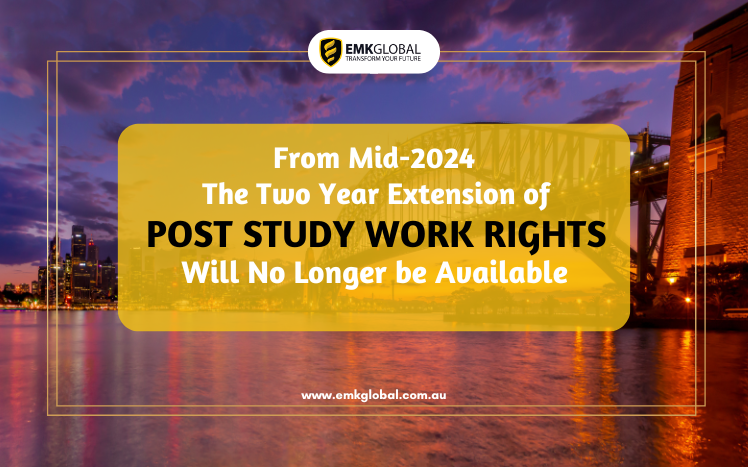Introduction
Australia has been a preferred destination for international students due to its high-quality education system and opportunities for post-study work. However, starting from mid-2024, significant changes are being implemented regarding the post-study work rights for international graduates in the country.
Overview of Post-Study Work Rights for International Graduates in Australia
International graduates in Australia have traditionally had the opportunity to extend their stay in the country after completing their studies. This extension was facilitated through the Temporary Graduate visa (subclass 485), which allowed them to gain work experience related to their field of study.
Initial Introduction and Extension of Post-Study Work Rights
On July 1, 2023, an extension was introduced, providing graduates with degrees in specific fields facing skill shortages an additional two years on their Temporary Graduate visa. This extension aimed to encourage skilled migration and retention of talent in key sectors.
Changes Starting from Mid-2024
Unfortunately, starting from mid-2024, this two-year extension of post-study work rights will no longer be available. This change marks a shift in Australia’s approach to international graduates and their contributions to the workforce.
Impact on International Graduates
This change will have a significant impact on international graduates who were planning to utilize the extended post-study work rights to gain valuable work experience in Australia. Many students choose to study in Australia with the expectation of staying longer to build their careers.
Eligibility Criteria for the Temporary Graduate Visa
Despite the removal of the two-year extension, international graduates with Australian qualifications who meet the Australian study requirement will still be eligible for the existing Temporary Graduate (Post-Study Work stream) visa. This visa allows graduates to stay and work in Australia for a specified period based on their level of qualification.
Importance of Australian Qualifications
Having Australian qualifications remains crucial for international graduates seeking to stay and work in the country. These qualifications not only enhance employability but also contribute to the overall skill development and expertise in various industries.
Conclusion
In conclusion, the changes to post-study work rights for international graduates in Australia starting from mid-2024 reflect evolving policies and priorities. While the two-year extension will no longer be available, eligible graduates can still pursue opportunities through the Temporary Graduate visa. It’s essential for international students and graduates to stay informed about these changes and explore their options accordingly.
FAQs about the Changes
- Will international graduates still be able to work in Australia after completing their studies?
- Yes, international graduates meeting the eligibility criteria can still apply for the Temporary Graduate visa.
- What are the key requirements for the Temporary Graduate visa?
- Applicants must have completed an eligible qualification from an Australian institution and meet health and character requirements.
- Can international graduates apply for permanent residency through the Temporary Graduate visa?
- The Temporary Graduate visa does not directly lead to permanent residency, but it can provide pathways for skilled migration depending on individual circumstances.
- How will these changes impact Australia’s workforce?
- The changes may lead to adjustments in the composition of Australia’s workforce, particularly in sectors reliant on international graduates for skilled labor.
- Are there any exceptions to the changes in post-study work rights?
- Some exceptions may apply based on specific agreements or programs between Australia and other countries.


